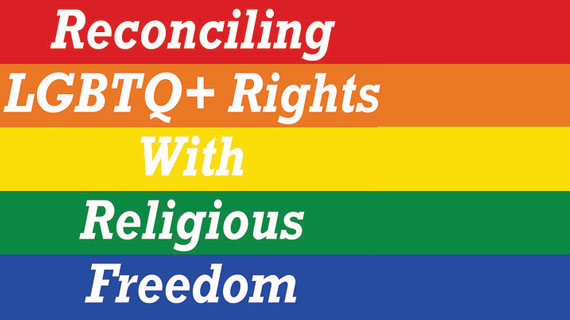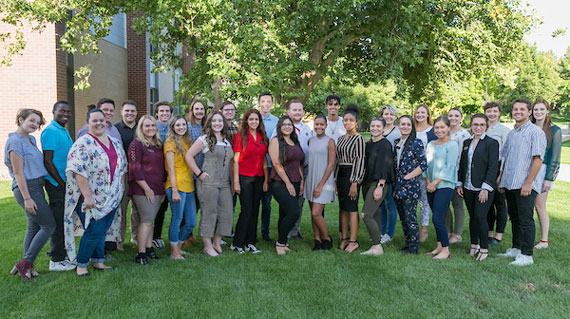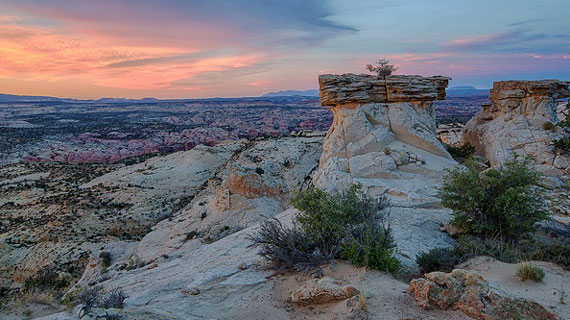Reconciling LGBTQ+ Rights and Religious Freedom
Posted: March 06, 2018 | Author: Cami Mathews | Read Time: 5 minutes
 The Michael O. Leavitt Center for Politics and Public Service hosts Pizza & Politics every Wednesday at noon to discuss a current political topic. Leavitt Center student employees research the topic and moderate the conversation. These discussions expose students to a variety of important issues and encourages them to share their own perspectives while learning all sides of an issue. Free pizza is provided for all who attend.
The Michael O. Leavitt Center for Politics and Public Service hosts Pizza & Politics every Wednesday at noon to discuss a current political topic. Leavitt Center student employees research the topic and moderate the conversation. These discussions expose students to a variety of important issues and encourages them to share their own perspectives while learning all sides of an issue. Free pizza is provided for all who attend.
This week’s conversation did not shy away from sensitive topics, covering two identities that many students at Southern Utah University align with. The topic, LGBTQ+ Rights and Religious Freedom, was moderated by Autumn Boren, a sophomore English Education major from Dallas, Texas, and Shelese Stoddard, a junior Political Science major with a minor in Sustainability from Reno, Nevada.
The conversation started with some background information giving everyone a baseline from which to begin a productive dialogue. LGBTQ+ rights are civil rights, originating in the 14th amendment, “No state shall make or enforce any law which shall abridge the privileges or immunities of citizens of the United States; nor shall any state deprive any person of life, liberty, or property, without due process of law; nor deny to any person within its jurisdiction the equal protection of the laws.”
Religious freedom comes from the 1st amendment, “Congress shall make no law respecting an establishment of religion, or prohibiting the free exercise thereof…” The idea of separation of church and state is paraphrased from a latter that Thomas Jefferson wrote in support of the amendment.
Should religious freedom be limited to personal / private life?
Many students were conflicted with this question. Some felt they should have the opportunity to showcase their religious beliefs expressing that there was no harm in letting people know about their religion, feeling that religious freedom extended further than the walls of their home.
The other side made arguments for understanding a separation of personal with professional lives. Though many people would be able to separate church and state, many have a blurry line between the two that leads to more confusion. Religion should be a private, personal moment that does not need to be shared with everyone.
Thoughts on businesses choosing who they serve based on the identity of the customer?
An early comment offered the idea to think about different types of businesses. She said that if a business offers something personal, such as a piece of art, the artist should have a say in what they create. If the business offers an easily copied good or service, there should not be a chance to say no to a customer. The point allowed students to think of the identities of both the business owner and the customer; an interesting point that many said they had never thought of before.
Other students felt that a business owner should not be able to discriminate in any way. When going through the process of receiving a business license and jumping through the hoops, the owner needs to understand what they are agreeing to. A customer should not have to go somewhere else for a good that most other people would be given. What if the store was in a small town like Cedar City and a person did not have an option to go somewhere else?
Does the government need to protect LGBTQ+ youth from controversial religious practices?
The majority of the room simply stated yes. The main controversial practice in question was conversion therapy, a range of dangerous practices that falsely claim to change a person’s sexual orientation or gender identity or expression. One member in the audience gave his story on being sent to one of these camps when he was younger. He stated it made no difference on his orientation, because that cannot be changed, but that he had to go through a lot of therapy to work through mental abuse from that camp.
Some of the conversation did wonder how far was too far in telling parents what to do with their children. The room was in agreeance on conversion therapy, but talked on smaller, less dangerous choices a parent might make to hide their children from certain identities. The group was split in this aspect, wondering if the government had any right meddling in parental choices.
Is our government treating LGBTQ+ discrimination differently than other forms of discrimination?
The audience split in two for this question: the government is not focused on it enough, or this issue is new compared to others, so give the government some time. The argument for the latter was that civil rights have always been a fight in America. From marches to sit-ins to voting people out of office, Americans have always stood up for what they believe in. Other forms of discrimination have been fighting far longer than those in the LGBTQ+ community. People need to understand the fight is young and change will take place, but not immediately.
Those that were not as patient felt the government does not care about LGBTQ+ rights like other forms of discrimination. They felt the community is underrepresented and lacking the resources that other forms of discrimination receive. However, no one pitted one identity against another, as everyone is in the fight together, just in their own way.
The conversation was a productive way to discuss two seemingly combative topics. Many people left with an understanding of those next to them that they never knew before. Students were able to put aside their differences and come together to spark conversation, as opposed to sweeping the issues under the rug.
This article was published more than 3 years ago and might contain outdated information or broken links. As a result, its accuracy cannot be guaranteed.
Tags: Student Blog Leavitt Center




